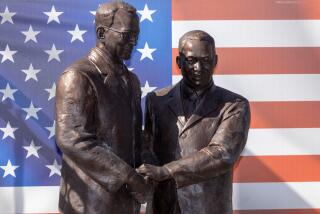A Quiet, Determined Man at One With His City and His Time
- Share via
Tom Bradley became the first African American elected mayor of a major American city without a large African American population.
Bradley helped to shape a new force in city politics, composed of African Americans and Jews active in the liberal wing of the Democratic Party. They helped him win his council seat and then helped him take over City Hall 10 years later. These reformers, opposed to the machine politics that dominated the state Legislature, could only have succeeded in Los Angeles, a city that respected and revered the politics of reform and loathed the politics of machines and bosses.
Even when he lost in 1969 to Mayor Sam Yorty, Bradley received more than a third of the white vote, a record for African American mayoral candidates in large cities that stands to this day. When he won in 1973, he won nearly half of white votes (including the great majority of Jews), a majority of Latinos and the nearly unanimous endorsement of African Americans. Upon his election, he flung open City Hall and suddenly African Americans, Jewish liberals, Latinos, Asian Americans and women began shaping government policy in Los Angeles.
In particular, Bradley’s role in forging a close relationship between African Americans and Jews stood in stark contrast to the failure of such efforts in New York City. In Bradley’s coalition, the two groups worked together as a team to resolve conflict, generate leadership and promote change. In 1979, big cities were struck by conflict between African Americans and Jews over the firing of United Nations Ambassador Andrew Young by President Carter. Only in Los Angeles could the two groups, accustomed to working together, meet and issue a joint statement that calmed the troubled waters in the city.
Bradley’s greatest moment may have been the 1984 Olympics, when the city pulled together, traffic flowed like water and an impressed world watched. But his toughest victory may have come in 1992, when with his political coalition in tatters and the inner city in glowing embers, he forged a consensus behind the recommendations of the Christopher Commission to restructure the LAPD.
The mystery of Bradley’s political success can be traced to a personality not often seen in politics. There were no great speeches. There were no pithy quotes. If you expected a person able to mingle easily with the crowd, to make small talk, to slap backs, you would not have seen it.
Bradley was never a dynamic speaker, and while he attended many community events, he was not much of a glad-hander. Yet his presence at an event was hugely important and well remembered. And in a city without a dominating political culture, such a man could have great political success by force of personality and by the consistency of his commitment to the community. In New York City’s rough-and-tumble politics, he would have seemed hopelessly bland; in Los Angeles, he was as if drawn for the part by Central Casting.
The shattering blow of the 1992 civil disorder was heartbreaking to Bradley. Much of what he had worked to build in South-Central Los Angeles was shattered and even worse, some blamed him for being too distant from the inner city. That must have been deeply wounding. And yet in the efforts to rebuild Los Angeles that have sprouted since 1992, one can see the impact of the intergroup coalition style that Bradley and his many associates brought to the head table at City Hall.
When President Clinton announced his race initiative, many in Los Angeles responded that this city already has been working overtime to bring its many diverse groups together. Maybe, they said, the president should come here to see how hard people can work to cross bridges. All those involved in that heroic bridge-crossing are heirs of a quiet but extraordinarily determined man who overcame many barriers before leading us all across that bridge. As always, he led by example.
More to Read
Sign up for Essential California
The most important California stories and recommendations in your inbox every morning.
You may occasionally receive promotional content from the Los Angeles Times.













